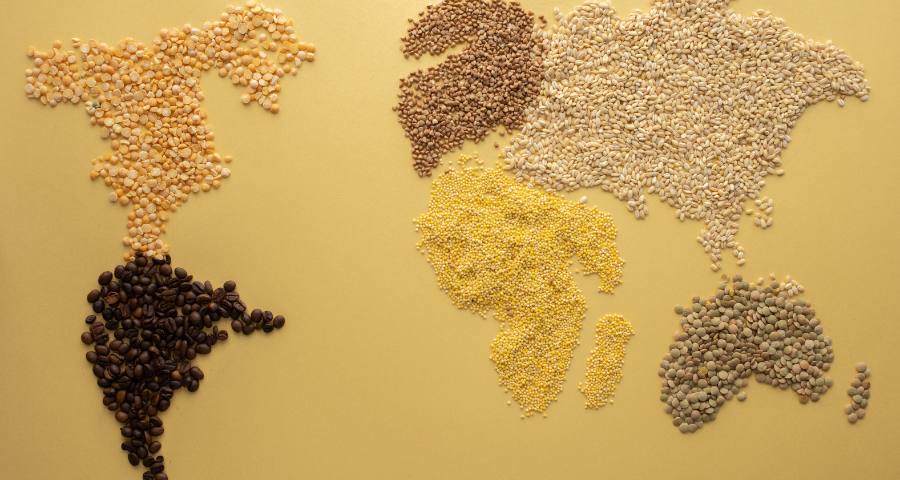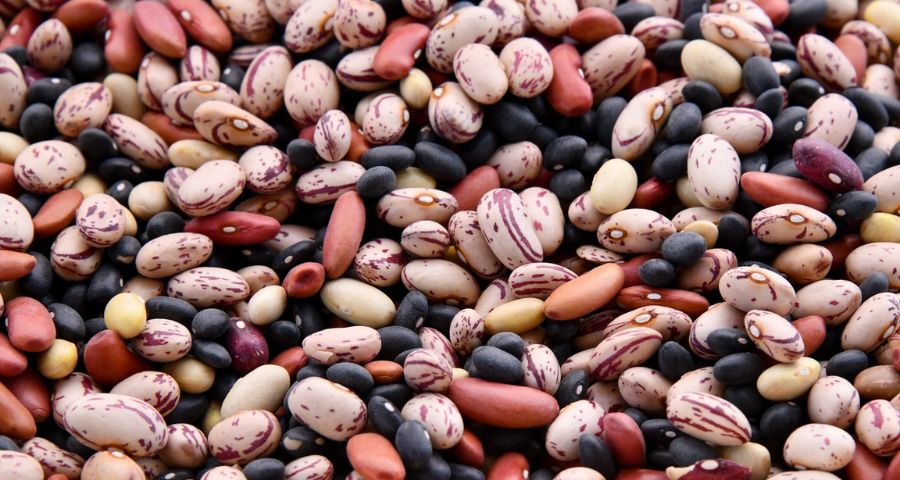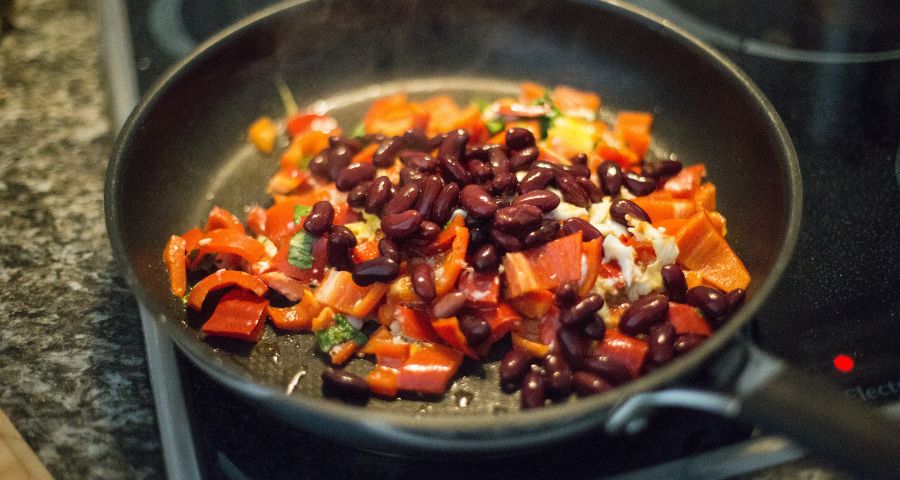A staggering 2.3 billion people – nearly 30% of the world’s population – were food insecure in 2021, and an even larger number of 3.1 billion could not afford a healthy diet. While numbers like these may be hard to fathom, they paint a stark reality. We need immediate action moving beyond primary food insecurity response (i.e., providing sufficient food supply), to advance nutrition security, or consistent access to nutrient-dense foods that promote well-being throughout the supply chain. Thankfully, we already have a perfect solution: beans and other pulses. Through the power of partnership, we are uniting to amplify a clear message on the power of pulses. Beans is how (#BeansisHow) we can help tackle our seemingly insurmountable nutrition insecurity problems.

What Makes Beans so Special Nutritionally?
Beans and other pulses are incredibly nutrient-dense. They are rich in protein, more so than other staple crops when examined on a caloric basis. For example, in 100 calories of beans, there are approximately 7 grams of protein, whereas the same 100 calories of rice or corn tortillas provides only about 2 grams of protein. This is especially relevant considering the rates of protein deficiency among people suffering from malnutrition globally, which can have devastating effects on health. Importantly, beans are also one of the richest natural sources of dietary fibre, offering two to three times more dietary fibre than even whole grains. It is not only the amount of fibre that is important but the type. For instance, beans contain viscous (soluble), non-viscous (or insoluble) and fermentable fibre, all of which have unique and beneficial benefits for our health.
In addition to protein and dietary fibre, beans and other pulses are rich in micronutrients that are consumed in inadequate amounts in many regions around the world, such as potassium, iron, and several B vitamins. A recent study by Mitchell and colleagues (2021) found that pulse intake improves nutrient density among US adult consumers. Individuals who consumed pulses had higher intakes of fibre, folate, and magnesium. Moreover, higher-level pulse consumers had improved intakes of potassium, zinc, iron, and choline, as well as lower fat intake. The nutrient-density and low-fat content of beans and other pulses can help simultaneously improve nutrient intake while allowing individuals to remain within the recommended calorie levels of dietary guidelines.
In countries where the national guidelines include specific recommendations and messages related to beans, the extent of detail provided varies considerably. In the United States, the unique and impressive nutritional profile of pulses results in them being counted in not just one but two food groups (protein and vegetable) in the Dietary Guidelines for Americans. Several dietary guidelines across the world recommend regular consumption – or even daily, as in the case of countries like Costa Rica. In India, the government promotes 60-120 grams of pulses per day for vegetarians, and 30-60 grams per day if eaten with other animal proteins.

How Do Beans Promote Well-Being?
Beans have an impressive list of attributes that benefit the health of both people and planet, making them an ideal food to help achieve the Sustainable Development Goals (SDGs).
- Beans offer many human health benefits. Beans are nutrient rich, which is why beans and other pulses are associated with a wide variety of health benefits, including chronic disease prevention (e.g., type 2 diabetes, cardiovascular disease, and certain cancers like colorectal cancer) and the promotion of healthy weight maintenance and gut health. It is likely that beans are associated with many of these benefits due to their high fibre content.
- Beans are affordable. In most countries, dry beans and other pulses are economically priced, making them one of the most affordable sources of protein. It is critical that nutrient-dense foods be affordable so that everyone has access to them.
- Beans have a long shelf-life. Dry beans can be stored for a long time and maintain their nutrient content. This may help prevent food waste and provide a nutrient-dense food source that is available year-round.
- Beans promote sustainability. Beans are well-known as a sustainable crop. They improve soil health and require less fertilisers than other crops, thereby minimising issues associated with fertiliser runoff into water systems and reducing input costs for farmers. Among the myriad of other environmental benefits, pulses offer lower water usage than other crops and sources of protein, as well as helping reduce greenhouse gas emissions due to a lower carbon footprint than other protein sources.
- Beans are culturally responsive. Pulses have been grown for thousands of years around the world, and many cuisines have pulse-centric dishes. Thus, this nutrient-dense food can be incorporated into traditional, beloved dishes of cultures around the world.
- Beans can support smallholder farmers. In addition to being a desirable crop for large scale farmers, pulses can be an ideal choice for smallholder farms. Beans can diversify the farm, provide a source of income, and benefit soil health and integrity. Moreover, they provide an accessible and nourishing food source with a long shelf life, which may be especially important against the reality of so many being food insecure and facing malnutrition.

The Importance of Partnerships
Launched at COP27 in November 2022, Beans is How is a bold, new initiative with the ambition of doubling global bean (and other pulse) consumption around the world by 2028. Through consumer-focused behaviour change campaigns, we aim to make beans desirable, visible, and exciting, positioning them as a superpowered, climate-smart ally to improve nutrition, climate, and cost of living challenges around the world.
With their seemingly limitless benefits, one would think that pulse intake would already be high. Yet, the reality is that consumption is low due to certain barriers to consumption, such as long cooking times and unfamiliarity over how to use pulses, along with their perception as a “poor person’s food”. This is where our campaign and other bean advocates have an essential role to play, to address misinformation and negative perceptions.
Mobilised by the SDG2 Advocacy Hub, Beans is How is supported by a network of Bean Coalition partners and Champions who will contribute to achieving the ambition through transformational programmatic and organisational efforts, together with innovative communications and advocacy. Efforts include storytelling, marketing and informational campaigns; new reporting to track bean production and consumption; promotion of new bean recipes and cooking tips; and commitments to incorporate beans into corporate and retails strategies, to name a few.
As Paul Newnham, Executive Director and Chief Beans Officer at the SDG2 Advocacy Hub says, “We cannot keep pace with the current rate of resource depletion and unequal access to food, causing some people to go hungry, and others to create incredible waste. How can we support a shift to the healthy and fair food systems of the future for both people and planet? Beans is How, and our efforts are already showing the power of a collective turning talk into action."
Beans and other pulses are the perfect food for conscious consumers who care about their health and the planet, with affordability as an added benefit. It is important to ensure a culturally sensitive and localised approach, re-introducing pulses back into diets where tradition has been lost, and changing stigmas about beans as a food for the poor. To do this, we are working with partners to celebrate the impressive versatility of pulses, drawing upon new ideas and a long history of cultural traditions to promote pulse-centric dishes from around the globe. Overall, emphasising the culinary versatility, affordability, environmental and health benefits of pulses will help a wider audience understand the important role pulses must play in a sustainable and delicious future.
Beans is How is also guided by a Scientific and Innovation Advisory Council who will validate the campaign’s Theory of Change and Research Agenda. Members include experts in food systems, nutrition and diet, bean genetics and breeding, soil chemistry and crop agronomy, climate adaptation and mitigation, economics, analytics, public health, and behavioural science.
Trans-disciplinary efforts are becoming increasingly common, and bean breeders and nutrition researchers are working together to evaluate different varieties for nutrition content and bioavailability of nutrients, and factors such as cooking time. Longer cooking times represent a potential barrier to consumption because: 1) they are less convenient for consumers; and/or 2) they require more fuel to cook, which may not be readily available and equally accessible to everyone in all parts of the world. Thankfully, we already have the innovation, science, and potential solutions to address these barriers.
To improve global well-being and advance nutrition security, we must all work together to reverse the trend of low intake and establish pulses as a staple, desirable food in diets around the globe. World Pulses Day is a good reminder of the important work we have ahead — and all the benefits we will reap from a job well done. We hope you will join us!
Alyson Greenhalgh-Ball is a member of the Beans is How Science & Innovation Advisory Council. She is an executive with over twenty-five years’ experience in public health spanning healthcare, academic, non-ex, commercial and as a global nutrition lead within the food industry. Alyson is the Founder of Conscious Impact, a board member for numerous private and public sector organisations, a former Business Fellow at the University of Oxford and Vice-Chair of the British Nutrition Foundation.
Chelsea Didinger is the Founder of A Legume a Day, an informational communications platform and member of the Beans is How Coalition. She is also the Executive Director for the Colorado Dry Bean Committee. As a Food, Science and Human Nutrition PhD Candidate at Colorado State University, graduating in 2023, her doctoral research focuses on translational efforts to promote bean intake to consumers to advance public and environmental health. Working with researchers, extension, farmers, processors, and other partners, she strives to adopt a holistic food systems approach that promotes thriving local food systems and communities. She received her Bachelor's degree in Biology at the University of California San Diego and her Master's in Biology at Seoul National University in South Korea.